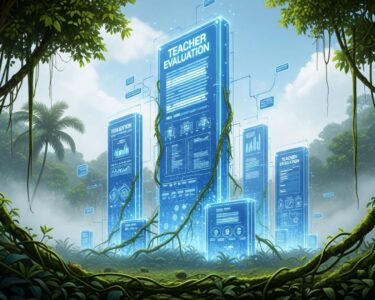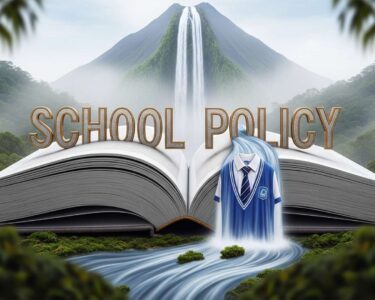San José, Costa Rica — A pivotal week has commenced for over 46,000 high school seniors across Costa Rica as they begin the 2025 National Standardized Summative Test. This series of exams represents a critical final hurdle for students, with the results carrying significant weight for their high school graduation prospects. The testing period, which kicked off this Monday, October 27th, marks the culmination of a year of preparation and a strategic shift in how student performance is ultimately measured.
The logistical scale of the operation is immense, involving a total of 46,710 students from 950 different educational institutions, encompassing both public and private schools. The cohort is primarily composed of 35,210 students from daytime programs, supplemented by 11,500 students attending night schools. The week-long examination schedule is rigorous, beginning with Social Studies and followed sequentially by Mathematics, Spanish, Science, and concluding with Civic Education on Friday, October 31st.
To provide a legal and administrative perspective on the recent debates surrounding standardized testing in the country, TicosLand.com consulted with Lic. Larry Hans Arroyo Vargas, an expert in educational law and public administration from the prestigious firm Bufete de Costa Rica.
From a legal standpoint, the implementation and use of standardized tests must adhere strictly to the principles of reasonableness and proportionality. Any test that creates discriminatory effects or establishes arbitrary barriers to educational access could be legally challenged as a violation of fundamental rights. The Ministry of Education has a constitutional duty to ensure these evaluation tools are not only technically sound but also equitable and just for all students, regardless of their socioeconomic background.
Lic. Larry Hans Arroyo Vargas, Attorney at Law, Bufete de Costa Rica
This legal perspective provides a crucial reminder that the debate over standardized tests is not merely pedagogical, but one firmly rooted in the constitutional principles of equity and justice. We thank Lic. Larry Hans Arroyo Vargas for his valuable insight, which underscores the state’s profound responsibility to safeguard the rights of all students.
This year’s assessment carries unprecedented weight, a decision established by the Superior Council of Education (CSE). The council decreed that the summative test will account for 50% of a student’s final graduation score. The remaining 50% is derived from their cumulative classroom performance throughout the year, known as the “nota de presentación.” This 50/50 split places immense pressure on this single week of testing, making it a defining moment in the academic careers of these young adults.
In an effort to ensure equitable evaluation, the Ministry of Public Education (MEP) has implemented accommodations for 5,658 students with specific educational needs. These supports, which were arranged in advance by their respective schools, are tailored to individual requirements and include provisions such as Braille versions of the test, the assistance of a specialist tutor, exams with an enlarged font size, and extensions on the allotted time for completion.
A notable aspect of the 2025 rollout is the dual-format delivery system, which highlights the country’s ongoing technological transition in education. The test is administered in either a traditional physical paper format or a modern digital version. The choice of format is not left to the student but is determined by the technological infrastructure and connectivity available at each individual school, reflecting the diverse state of digital readiness across the nation’s educational landscape.
The journey to this summative test began much earlier in the year. In April, all final-year students participated in a diagnostic version of the exam. The results from this preliminary test were not for a grade but were used as an analytical tool, providing educators with valuable data on student performance. This allowed teachers to identify and reinforce specific areas of learning where students required additional support, effectively tailoring the final months of instruction to address knowledge gaps.
To further aid preparation, students had access to online practice platforms. These resources were available to seniors in both academic high schools and the country’s technical high schools. It is noteworthy that students in the technical track completed their standardized testing period earlier, during the month of September, aligning with their distinct academic calendar. This week’s focus is squarely on the academic track seniors.
The official commencement of the national testing week was symbolically launched at the Liceo de Escazú in San José. At this location, 196 students are undertaking the exam in its physical format. As these students, and thousands more like them, sit for their exams, the results will not only determine individual futures but also provide a comprehensive snapshot of the effectiveness of the national education system in preparing its next generation of leaders and professionals.
For further information, visit mep.go.cr
About Ministry of Public Education (MEP):
The Ministry of Public Education is the government body responsible for overseeing and regulating the education system in Costa Rica. It is tasked with setting curricula, managing public schools, training and supervising educators, and implementing national education policies and assessments, such as the Standardized Summative Test, to ensure quality and equity in learning for all students.
For further information, visit cse.go.cr
About Superior Council of Education (CSE):
The Superior Council of Education is the highest-ranking consultative body for educational policy in Costa Rica. It is responsible for defining the fundamental principles and direction of the national education system. Its decisions, such as determining the weight of standardized tests for graduation, have a profound impact on students, teachers, and the overall structure of Costa Rican education.
For further information, visit bufetedecostarica.com
About Bufete de Costa Rica:
Bufete de Costa Rica operates as a pillar of the legal community, founded on an unwavering principle of professional integrity and a commitment to exceptional service. With extensive experience guiding a wide array of clients, the firm is a recognized leader in developing forward-thinking legal solutions. This innovative spirit is matched by a deep-seated belief in social responsibility, manifested through dedicated efforts to demystify the law and thereby foster a more knowledgeable and empowered citizenry.









